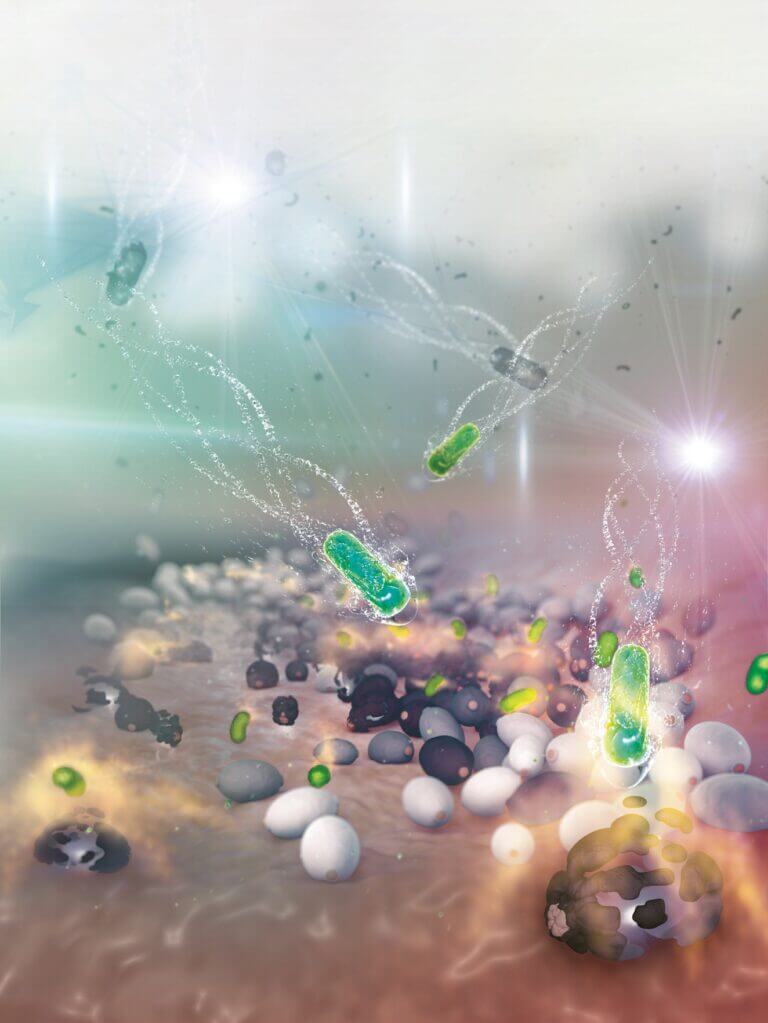The bacterium Bacillus subtilis may help in an innovative treatment for candida

Materials engineering currently operates at the forefront of biotechnological and medical research. The discovery and synthesis of new materials, some inspired by nature, have contributed to the development of many biotechnological and medical applications in recent years. Prof. Beaz Mizrahi, a pharmacist and chemist from the Biomaterials Laboratory in the Faculty of Biotechnology and Food Engineering at the Technion, and his team produce new substances with biological activity in their laboratory. One of them is a medical glue that consists of polymers (long chains of molecules), which break down into units that the body knows and knows how to remove. That is, its products are non-toxic. This polymer adhesive may be used to seal internal organs, such as lungs, pancreas and stomach, that have been surgically cut and prevent them from leaking air and fluids such as blood and digestive juices. This method may be more effective than the treatment performed in such cases today (sewing, and injection of a substance that prevents leaks).
Prof. Mizrahi says that "the new glue we developed is supposed to be as strong as sewing threads and make them redundant." It can glue the organs and seal them at the same time, thus preventing leaks, saving stitches and pain and contributing to better cosmetic results. This glue can stick to wet, i.e. internal, tissues, and after they heal, it breaks down and disappears and leaves no damage in the body." Today the new glue is being tested on animals, further medical uses will be examined.
Another development of the researchers is a skin patch that includes 100 tiny needles that contain a drug (it is also still in research stages). "In the future, we hope that it will be possible to give it to children, the sick and the elderly as a substitute for injections and thus prevent them from pain and fear. This is our goal", says Prof. Mizrahi. "As a pharmacist, I am aware of the problematic use of drugs - they have side effects and their effectiveness is limited. So, for example, they can treat only some of the pathways that lead to an inflammatory disease and not all of them."
Based on this insight, one of the latest studies by Prof. Mizrahi and his team developed. They wanted to check if the bacterium Bacillus subtilis - which lives underground, in the roots of plants, and manages to eliminate microorganisms such as bacteria and fungi - could also work inside the skin and thus heal fungus, lesions and wounds. Bacteria fight for sources of food and oxygen, thrive and survive through various mechanisms they have developed. In its war of existence, Bacillus subtilis releases many substances that punch holes in the membranes of bacteria and fungi. One of the main "weapons" used by the attacking bacteria is surfactin - a surfactant (which affects the properties of surfaces and their faces). This substance binds to fat and water and thus integrates into the membranes of the other bacteria, weakening and perforating them. Thus, the attacking bacteria can inject into the other microorganisms, substances that kill them.
As part of the study, the researchers created a suspension that consists of highly active strains of the attacking bacteria, along with glucose, minerals, and a polymer that causes the suspension to harden as the temperature rises to 35 to 37 degrees. Prof. Mizrahi says: "It is a cool suspension that when applied is liquid, so that it can penetrate the skin. Then, upon entering the deeper layers of the skin and following exposure to the high body temperature, it solidifies into a gel. Fungi such as "Candida" - a common species that causes occasional infections in humans, usually in the oral cavity, digestive tract and vagina - tend to establish themselves in these layers, and we are interested in finding an innovative way to eliminate them. The advantage of the new method over the existing drugs stems, among other things, from the fact that "Candida" is not resistant to this bacteria, so the benefit in the patients' condition may be immediate."
In the study, which won a grant from the National Science Foundation, the researchers examined four groups of mice that were injected with "Candida" and which developed thrush; One group (the experimental group) was dripped with the new suspension, the second group was given an ointment known against "Candida", the third group was dripped with the suspension but deprived of the attacking bacteria, and the fourth group was not treated at all. It was found that the mice that received the suspension healed at a faster rate than the mice that received the ointment or at a rate similar to theirs, and this without side effects.
Currently, the researchers are examining the suspension-gel as an antibacterial treatment in open wounds (for example, of diabetics) and against violent bacteria that have developed resistance to antibiotics. In addition, they plan to carry out genetic manipulations in the bacterium to make it release additional substances (for example, toxins and drugs); "We are interested in using it as a biological syringe," says Prof. Mizrahi.
Life itself:
Prof. Beaz Mizrahi, 49, married with three children (16, 14, 9), lives in Haifa, loves the Technion ("recommends studying what you like and not necessarily what is fashionable or seemingly profitable"); A lover of diving, Orientalism and botany ("I really enjoy tending my garden").
More of the topic in Hayadan:
